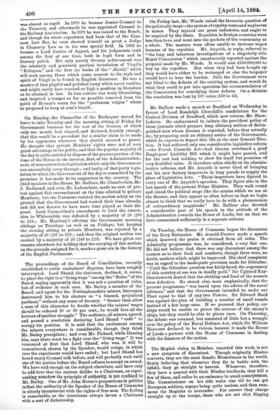On Tuesday, the House of Commons began the discussion of
the Navy Estimates. Mr. Arnold-Forster made a speech. which deserved the praise it obtained from all sides. The programme was, he considered, a very fair one.. He did not believe that there was any discontent among the seamen as to their food and comforts, though there were, no• doubt, matters which might be improved. His chief complaint was in regard to the inadequate provision made for Gibraltar- " Until the Gibraltar qnestion was fairly faced, the supremacy- of this country at sea was in deadly peril." Sir Ughtred Kay- Shuttleworth denied that the clothing and food of the seamen were defective. He stated also, most emphatically, that the- present programme " was based upon the advice of the naval' advisers," and that the Government intended to make our- Fleet equal to that of any two Powers. Sir Edward Reed, was against the plan of building a number of small vessels instead of a few large ones. If we pursued that policy, our- ships would be unable to pierce the armour of the enemy's. ships, but they would be able to pierce ours. On Thursday, the debate was resumed, but consisted of little but a wrangle over the policy of the Naval Defence Act, which Sir William Harcourt declared to be vicious, because it made the House of Lords a partner with the House of Commons in dealing with the finances of the nation.


































 Previous page
Previous page